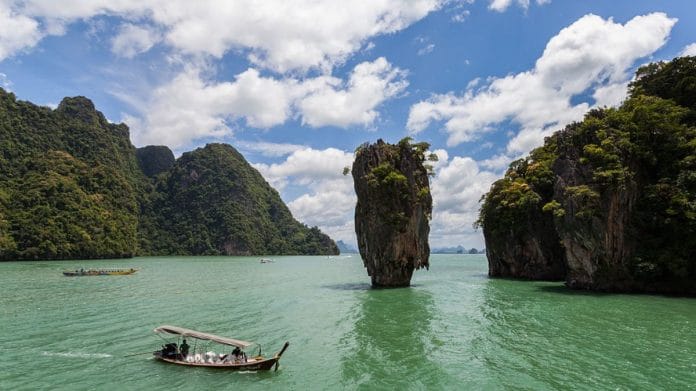Houston/Bangkok/Manila: Thai Environment Minister Varawut Silpa-archa has wanted for decades to give the country’s national parks time to recover from the damage caused by an endless stream of tourists. Covid-19 gave him the chance.
Now, able to see the benefit of giving nature a respite, Varawut is going further. He has decreed that all national parks in Thailand will close for an annual average of three months, beginning in 2021. It’s a bold move to make the nation’s vital tourism industry more sustainable — one that puts him at odds with many businesses in hotspots like Phuket that are being crushed by re-opening delays.
“We have to find balance and should use this pandemic as a lesson,” said Varawut, 47. “If humans keep on abusing Mother Nature, one day she will take it back. She’s taking it back now.”
Tourism has been among the biggest economic victims of the pandemic, with the industry losing 440 million visitors and $460 billion globally in the first half of the year, according to the United Nations World Tourism Organization. But the virus, which has killed more than a million people, has also forced an awareness of the effects industries from power generation to air travel have had on the environment.
Since Thailand banned overseas visitors because of the pandemic, more killer whales and dugongs have been spotted roaming Thai waters, Varawut said. Rare leatherback turtles have been laying eggs in droves on beaches normally packed with sunbathers.
Other tourism-dependent countries have noticed benefits to nature. Bryan Celeste, the 24-year-old mayor of Alaminos in the Philippines, said in his constituency’s Hundred Islands National Park, the local scubasureros — divers who collect garbage — have been retrieving only a few kilograms a month recently, compared with hundreds before the pandemic.
He’s also pushing for longer-term tourism restrictions even as the local government faces an estimated loss of about 40 million pesos ($824,165) in revenue this year, without accounting for the damage to businesses.
Celeste commissioned a “carrying capacity” study to help decide visitor limits to the park and is considering using a digital visitor management platform such as homegrown Visita to help monitor tourist numbers.
The moves to shorten tourism seasons have met with resistance from travel-related businesses, most of whom are counting on a recovery in visitor numbers once global restrictions ease. Travel and tourism contributed about 12% of Southeast Asia’s GDP last year and 13% of employment, according to the World Travel & Tourism Council.
“It’s the rule that looks good on paper,” said Kalawin Kumnaung in Koh Samet, Thailand, a fire dance performer also known as Petch. “But in reality, especially for small business operators who have rent to pay, the two-month closures will be devastating,” said Kalawin, who also owns a bar on the island where he’s lived for more than 30 years.
Tourism authorities also are being cautioned to not appear to be excluding key segments of the tourist population while promoting sustainability measures — and to focus instead on “how do we bring back the quantity and improve the quality at the same time,” said Steve Saxon, a partner for McKinsey & Co. in Shenzhen.
“Countries need to be careful how they talk about reducing tourism to not mean elite tourism only,” said Saxon. “Higher-end or more affluent tourism does support a bit more in terms of jobs and GDP, but in terms of flights coming in, hotel rooms you need — that’s dependent on the number of guests.”
Suvarin Mayazes, vice president of the Tourism Council of Thailand, said the government should worry more about damage from illegal activities rather than tourists. “Only illegal fishing boats will benefit from the park closures, not the environment, because they can operate freely without anybody seeing them,” said Suvarin, who owns Siam Catamaran Co. Ltd., a diving company that operates in the popular Mu Ko Chumphon National Park.
Mobility restrictions “caused a huge blow to the tourism industry, but did enable our environment to ‘rest and recuperate,’” said the municipal tourism office in Donsol, a Philippine dive site that’s home to endangered whale sharks. Donsol has had a longer-than-usual off-season this year as the virus struck before the naturally quieter July-October, when the whale sharks migrate elsewhere.
The drop in tourism may also allow officials an opportunity to assess the hidden costs of mass tourism, including pollution, groundwater contamination and infrastructure.
Most countries that rely on tourism for an economic boost have been more focused on trying to make up for lost income by promoting domestic travel, or using the downtime to spruce up attractions while awaiting the return of tourist hordes. Sri Lanka is enjoying something of a boom in domestic tourism, while at Cambodia’s world-famous Angkor Wat temple complex, authorities are adding flower beds and some 3,000 trees to the surrounding park and relocating unsightly shops and stalls from the front of the complex, according to a local news report.
New Zealand, which is also encouraging locals to take domestic holidays, has set up a task force to look at the impact of tourism on the environment on concern that surging visitor numbers had begun to spoil the clean-green image that the nation promotes.
“Environmental and tourism priorities should be seen as partners in recovery,” said Billie Dumaliang, a Philippines-based conservationist and co-founder of Visita, who advocates higher-value, lower-volume tourism. But without government intervention to force the industry to take a more sustainable path, the onslaught of visitors may return.
“Most of the gains, like reduced carbon emissions and pollution, are immediately reversible once lockdowns are lifted,” Dumaliang said. -Bloomberg
Also read: Thailand imposes emergency in Bangkok as protesters defy monarchy, demand reform






